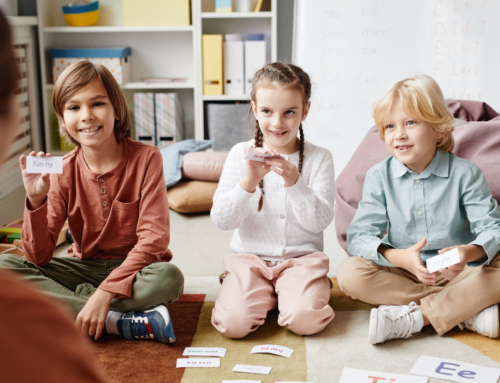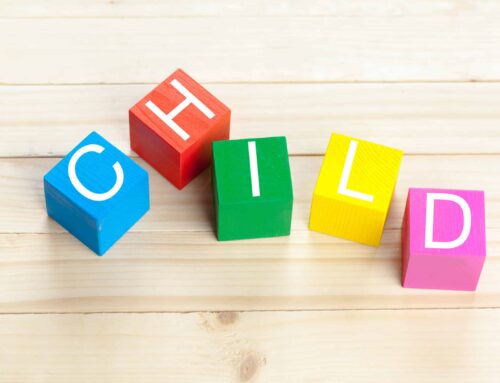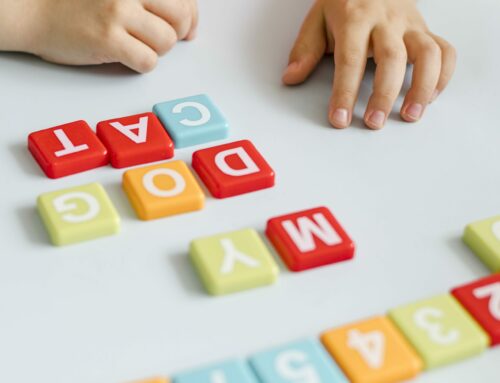We all want our children to be fluent in English by the time they reach adulthood. And we all know – all studies point in this direction – that it is by starting early, even when they are babies, that children have the best chances of becoming bilingual.
But how to do that when the familial unit does not allow it? What methods can be used, at home, to accompany your children in their learning of the English language?
Because young ears are more sensitive to differences in pronunciation and because of the way articulation remains in formation, children have a far easier time reproducing new sounds. At ages 2, 3, or 5, your children’s cultural, lexical, and phonological references form very naturally.
The Garden Academy has three bilingual schools in Paris welcoming children from 2 to 5 years old in our preschool and school programs. Our young pupils follow the full curriculum for those programs in English, supervised by a team of native English teachers. Fully immersed, they learn the English language through fun and creative workshops as well as exercises suited to their age.
Learning English is child’s play!
A Danish person or a Dutch will tell you: that learning English is easy! Easy for them maybe, but when you are an adult French person, you would need a lot more work to become bilingual! Do you speak English? Just a little bit!
Do not blush! French is a romance language and English is a germanic one. As such, those languages are different when it comes to syntax, accentuation, and rhythm, so much so that adult French people usually struggle when trying to learn English since they cannot trace over, either phonetically or linguistically, the language of Molière with that of Shakespeare.
On the other hand, children up to the age of 5 or 6 can reproduce sounds, imitate accents or ways to articulate words and so form their palate properly. They create neural pathways that will allow them to progress and practice this second language. The more they grow up, the more they lose this natural capacity for learning and reproducing foreign sounds… Hence the necessity of learning English from an early age!
Shape the Brain From an Early Age
The great capacity for learning English that children, and by extension toddlers, display can be explained scientifically. Children will experience throughout their development what neurology specialists call: The critical period. This refers to a time when new information can be fully assimilated, without effort. Experts in neurolinguistics fix the limit of this period to between 12 and 15 years old, that is to say, the beginning of adolescence, and we know that it is the very first years of this period (from 0 to 5 years old) that are the most profitable, from the first years in the nursery to the end of kindergarten.
If some parents are sometimes worried that their children, especially toddlers, cannot distinguish between the two languages, or that the second language would take over their native one, do not worry! All children are capable of assimilating two languages, one enriching the other, the other feeding the one…
Past the famous critical period, learning a foreign language becomes more laborious, as our brain structures its cells and the connections between them depending on the information we receive from an early age and our needs. A child that did not work with sounds differing from their native language, that did not use the neural pathways necessary to learn those, will have a lot more difficulties when they become an adult when trying to learn a foreign language.
Tips and tricks to use at home
The first piece of advice that education specialists will give you is to set up a learning routine for your children and to set it up from an early age. Start by picking a schedule, a day and a duration then plan out a program, even if it is a short one. 15 minutes sessions for younger children have been proven to be effective.
English can also be learned through games (Simon say is a good example, the English version of the French game Jacques à dit), but also songs, or videos of fairy tales and nursery rhymes (Super simple learning on YouTube), or even some cartoons (every teacher will tell you that Peppa pig is an excellent program to teach English to younger children).
Tell a story, read a book in English or leave your children the possibility to browse through a few select English works. Those are all ways to enrich your children’s vocabulary, improve their level of understanding of the language, and will help them progress rapidly. There are books for all ages, on all themes, and therefore for all tastes. Your children will be able to make those books theirs, opening and browsing through them at will. Stories will stimulate their imagination and improve their listening skills. You will find a multitude of stories and English children’s books, for example at The Garden Academy which regularly offers its selection of the latest publications.
Between apps like Duolingo (the most downloaded learning app in the world) and online websites designed for children: Digital supports to work on your children’s comprehension and vocabulary are plentiful! Learn English Kids is a website containing games and exercises. Sesame Street offers games, videos, songs, and many other activities with the famous muppets of the show, and Poisson Rouge is an incredibly fun website containing more than 300 games and activities to learn the alphabet, numbers, and vocabulary.
Whatever method you choose to use or the tips you’ll think of, every education expert will agree on one thing: Regularity is the key to success, even if it is only a few minutes every day! You could, for example, make a habit of selecting the original version when watching shows through streaming services like Disney+ so your children systematically watch their favorite cartoons in English.
Online classes with a teacher
Sometimes parental intervention is not enough or is not appropriate for the children. In these cases, calling on another person is a good idea. In those instances, parents will often offer online English lessons to their children: a simple way to put into practice what they learned. Your children will learn to interact with others using this new language, going outside of the familial unit.
The only problem is that virtual contact has its limitations, especially when it comes to younger children, where a physical immersion in a 100% English-speaking school will prove more effective.
How to learn English effortlessly
We often say that children are sponges, referring to the fact that they absorb everything. The younger they are, the more the saying holds true, because as they grow up, the alveoli shrink, and become narrower: your child relies on what they have learned, uses their references, and maneuvers with what they know. If they learn English from a young age, this new language will be naturally integrated into their evolution… As was the case when they learned their native language. They will learn with books, cartoons, games, maybe through videos for the older ones, and will develop their vocabulary: the English language will become part of their daily life.
To encourage this natural learning, The Garden Academy welcomes children in their three schools in Paris, in a fully immersive environment: Classes are taught by native English graduate teachers, offering a full immersion to your children. In this aspect, The Garden Academy goes further than a simple introduction to the language, than the first contact with a foreign language, or even further than a bilingual nursery: at The Garden Academy, your children will learn, grow, progress, and flourish in a fully English-speaking environment. They will be introduced to the English language in a school, methodically, through clear educational principles, but without making this learning a constraint.
Every day, our workshops go from phonetic, to sensoriality, passing by mathematics, reading, motor skills, and arts & crafts, allowing children to improve their English level without even realizing it! Following the active learning methods (most notably the Montessori method), The Garden Academy also offers yoga classes, full conscience meditation sessions, and gardening workshops, and allows your children to discover a large variety of life experiences so they may fully assimilate this foreign language into their daily lives.
The central role of music in becoming bilingual
A language isn’t just a string of sounds. All languages are spoken on the scale of musical notes, like songs. In linguistics, specialists call this phenomenon the sound spectrum. French is one of the most monotonous languages in the world with only three notes, compared to English which plays on seven notes!
This is why at The Garden Academy, we place music and singing at the center of our teaching. : because through singing, by listening to the melody, or by reproducing it, children will assimilate the notes of this new language, will learn to use them, play them, and will rapidly improve their English level.
More than a second language!
Learning English or any other language will bring far more than the simple fact of speaking two languages to your children. Of course, English will help them enroll in a good school, travel abroad, and better prepare them for their future professional life, but by all accounts, the benefits of becoming bilingual do not stop there.
When the brain learns a new language, it develops its cognitive abilities and creates new connexions that will then facilitate the assimilation of all sorts of new information. It becomes easier to communicate, focus, memorize, understand, and learn new things as well.
Teaching a new language to a child also means allowing them to open themselves to other countries of the world. They will discover a new culture and will be personally enriched by what they will learn. They will be more willing when they reach adulthood to travel abroad thanks to their language skills, but also thanks to their open-mindedness and greater tolerance.
The program proposed by The Garden Academy in their three bilingual schools in Paris will encourage children to question themselves and sharpen their critical thinking: major assets that will have a positive impact on their course of life both private and professional.





